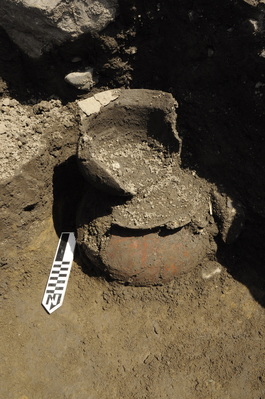
By: Robin Meyer-Lorey, UCLA
I have long had a passion for exploration and learning, which has culminated in a deep desire for travel and a love of history. I have always felt at home in the outdoors, and since my childhood I have been a hands-on learner. I remember combing through Native-American artifacts in my grandfather’s basement in Oregon, saddened but fascinated when he decided to return them to a local tribe. During the summer before beginning college, I was given the gift of a large stack of books. Among them were several books that covered archaeological discoveries. I was drawn in by the romantic title of Lost Land Emerging, the dramatic quote on the back of Island of Isis, “To speak of the dead is to make them live again,” and the incredible stories of Howard Carter and Heinrich Schliemann. These traits and interests found a perfect venue for expression when, upon beginning my first year at UCLA, I discovered that I could pursue archaeology as a field of study and possible future career. I find that learning about history in any form is one of the most rewarding things I can do, and the prospect of being able to literally uncover pieces of the past is incredibly exciting and stimulating to me. The idea of reaching back and touching things that had meaning to people who came long before me carries a profound sense of awe and importance.
In my first term at UCLA, I took a Southeast Asian history course because of a scheduling conflict, and ended up falling in love with this vibrant, complex, and understudied region of the world. This, coupled with an introductory archaeology course that used examples from excavations in Ifugao, inspired me to take a leap and apply to take part in the field school at the excavation over the summer. I was stunned and ecstatic when I learned that I had received acceptance and funding through the NSF-REU program. Since then, I have declared my major as anthropology and begun taking archaeology courses. I have read about Southeast Asia and the Philippines, and awaited the date when I depart for Ifugao with excitement.
Because I have only just completed my first year at UCLA, I hope to take advantage of my time with the IAP as an incredible learning opportunity. I look forward to wholeheartedly diving in to studying a topic which I find entirely fascinating. I am very excited to work alongside others who share genuine interest in the region and its history, and I feel very content knowing that the IAP encourages community involvement and is doing important work towards using education and history to resolve misunderstandings of local people and their heritage. This project exemplifies the huge importance of learning more about history through active engagement and study of underrepresented people and the areas they inhabit.
I have long had a passion for exploration and learning, which has culminated in a deep desire for travel and a love of history. I have always felt at home in the outdoors, and since my childhood I have been a hands-on learner. I remember combing through Native-American artifacts in my grandfather’s basement in Oregon, saddened but fascinated when he decided to return them to a local tribe. During the summer before beginning college, I was given the gift of a large stack of books. Among them were several books that covered archaeological discoveries. I was drawn in by the romantic title of Lost Land Emerging, the dramatic quote on the back of Island of Isis, “To speak of the dead is to make them live again,” and the incredible stories of Howard Carter and Heinrich Schliemann. These traits and interests found a perfect venue for expression when, upon beginning my first year at UCLA, I discovered that I could pursue archaeology as a field of study and possible future career. I find that learning about history in any form is one of the most rewarding things I can do, and the prospect of being able to literally uncover pieces of the past is incredibly exciting and stimulating to me. The idea of reaching back and touching things that had meaning to people who came long before me carries a profound sense of awe and importance.
In my first term at UCLA, I took a Southeast Asian history course because of a scheduling conflict, and ended up falling in love with this vibrant, complex, and understudied region of the world. This, coupled with an introductory archaeology course that used examples from excavations in Ifugao, inspired me to take a leap and apply to take part in the field school at the excavation over the summer. I was stunned and ecstatic when I learned that I had received acceptance and funding through the NSF-REU program. Since then, I have declared my major as anthropology and begun taking archaeology courses. I have read about Southeast Asia and the Philippines, and awaited the date when I depart for Ifugao with excitement.
Because I have only just completed my first year at UCLA, I hope to take advantage of my time with the IAP as an incredible learning opportunity. I look forward to wholeheartedly diving in to studying a topic which I find entirely fascinating. I am very excited to work alongside others who share genuine interest in the region and its history, and I feel very content knowing that the IAP encourages community involvement and is doing important work towards using education and history to resolve misunderstandings of local people and their heritage. This project exemplifies the huge importance of learning more about history through active engagement and study of underrepresented people and the areas they inhabit.
 RSS Feed
RSS Feed
